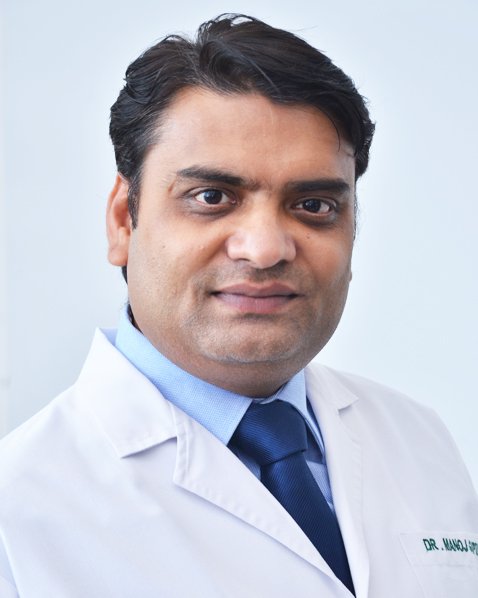Near Amrapali Green Society, Vaibhav Khand, Indirapuram, Ghaziabad, Uttar PradeshPSRI Hospital: Press Enclave Marg, J Pocket, Phase II, Sheikh Sarai, New Delhi, Delhi 110017

Head of Department Liver Transplant, Laparoscopic Surgery & Surgical Gastroenterology
![]() He is the best doctor i have ever seen. He is so humble and too polite. His behavior is too much friendly and he is too communicative. Most importantly he is available all the time for his patient.
He is the best doctor i have ever seen. He is so humble and too polite. His behavior is too much friendly and he is too communicative. Most importantly he is available all the time for his patient. ![]()
![]() A perfect blend of tremendous professional acumen and a wonderful human being.He is very helpful and approachable.Once you are with Dr. Manoj Gupta...rest assured, you are in safe hands....!!! Highly recommended.
A perfect blend of tremendous professional acumen and a wonderful human being.He is very helpful and approachable.Once you are with Dr. Manoj Gupta...rest assured, you are in safe hands....!!! Highly recommended. ![]()
Liver transplant is a major surgical procedure done under general anesthesia. During this surgery, the diseased liver of the patient is replaced with a healthy liver. As a portion of the liver is capable enough to transform into a full liver, the transplant may be either of the whole or partial liver. Liver transplant is the ultimate resort to liver failure. It is advised when the other methods of managing the symptoms of liver failure are fruitless and the patient is at risk of developing irreversible and life-threatening complications. The liver transplant is recommended in conditions such as alcoholic liver cirrhosis, primary biliary cirrhosis, hepatic cancer, and genetic disease causing significant damage to the liver.

According to an estimate, every year, more than 100000 people die to liver failure and the liver transplant in India is on the rise due to advanced technologies involved in surgery and high success rate.
The donor may be living or deceased and the success rate of liver transplant also depends upon whether the liver is obtained from a living donor or a deceased donor.
Liver transplant surgery is done under general anesthesia. Not all people are eligible for undergoing a liver transplant and not all people are eligible for donating their liver. Comprehensive health evaluation of both the donor and recipient is done to check the eligibility of liver transplant. Following are some of the tests conducted on the recipient to analyze his health status:
Imaging evaluation: Various imaging tests are done to determine the extent of liver damage. Imaging tests are also done to evaluate the health of other vital organs.
Laboratory tests: Blood and urine tests are conducted to check the overall status of health. Blood tests determine the Liver functions while urine tests indicate the functional capacity of kidneys.
Cardiovascular health: Cardiovascular screening is done to avoid any complications during and after the surgery. Blood pressure, heart rhythm and other vital parameters are recorded before surgery.
Psychological health: Psychological health check-up is also important as liver surgery may cause depression and anxiety in patients. It is also done to ensure that the patient is fully aware of the success rate and complications associated with the surgery.
Proper care of the patient should be done after a liver transplant. The patient should adhere to the guidelines specified by the transplant surgeon. It is also to be noted that a follow-up visit is an important part of post-surgical care regimen. The patient should never miss any follow-up visit as this would help to analyze the functioning of the liver periodically and evaluate how the liver is working. Further, if there is any abnormality seen, corrective steps can be taken instantly.
The patient should stay in ICU for a few days until the vital parameters get stable for a substantial period. After that, the patient is shifted in the ward. The period of hospital stay after surgery is generally 10-12 days. The doctor may prescribe various medications such as antibiotics, pain relievers, and immunosuppressants. Immunosuppressants are the medications that prevent the immune system from attacking the new liver.
It takes almost two to three months to get full recovery from liver transplant surgery. The patient may resume routine activities and even go to the office a few months after surgery. The recovery and healing period depend upon the severity of liver diseases and their complications before surgery.
Liver transplant surgery is major surgery. As with other surgeries, this surgery has complications which include:
Success rate: If done at right time, success can be acheived more then 95%.